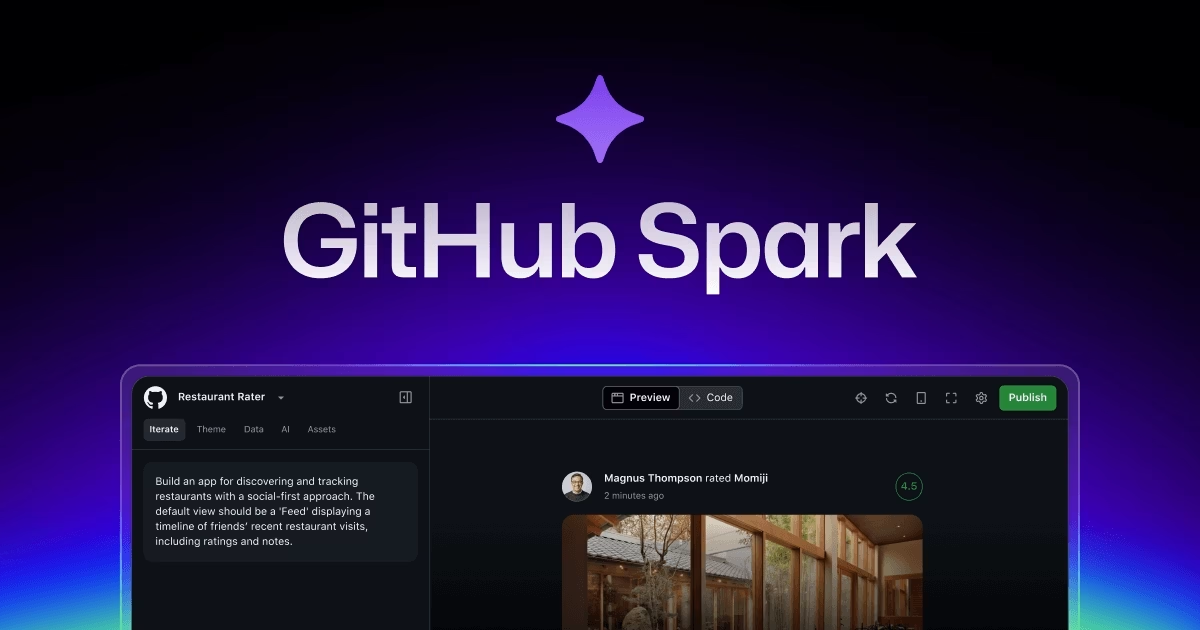GitHub Spark: Microsoft's Bold Leap Towards Natural Language Application Development
It seems like every other day, there's a new announcement in the AI space that makes you pause and think, "Wow, the future is really here, isn't it?" Microsoft, never one to sit still, has just dropped another intriguing development that fits this bill perfectly: GitHub Spark. This new feature, currently in public preview for those on Copilot Pro+ plans, promises to fundamentally change how we build and ship applications. From what I've seen, it's not just another incremental update; it's a significant stride towards democratizing software creation, letting users go from a mere idea to a deployed application using natural language. Pretty wild, right?
What Exactly is GitHub Spark and How Does It Work?
This isn't just about generating snippets. Microsoft's vision for Spark is to take an idea, scaffold an entire application, help you iterate on it, and then push it to production. It's like having an incredibly fast, always-on junior developer who understands your intent and can translate it into functional software. And because it's so deeply integrated into GitHub, it leverages all the existing workflows, version control, and collaborative features that developers already rely on. This deep integration is key; it's not a standalone tool but an extension of an ecosystem many of us already live in.
The Evolution of AI-Assisted Development: Beyond Code Suggestions
This represents a significant leap in the low-code/no-code movement. While low-code platforms have been around for a while, often relying on drag-and-drop interfaces or visual builders, Spark introduces natural language as a primary interface for complex application logic. This could potentially open up application development to a much wider audience – perhaps even business analysts or product managers who have a clear vision but lack the traditional coding skills. Imagine being able to articulate your needs, and watching a functional prototype materialize before your eyes. It’s a powerful concept, and one that could truly democratize access to building software.
Who Benefits from This Public Preview, and Why Now?
Currently, GitHub Spark is exclusively available in public preview for those with Copilot Pro+ plans. This isn't surprising. Microsoft often rolls out cutting-edge features to its premium subscribers first, giving them early access and, crucially, gathering valuable feedback from a highly engaged user base. These early adopters are often the ones pushing the boundaries, and their insights are invaluable for refining a tool of this magnitude.
The public preview phase is critical. It's where the rubber meets the road. Developers will test its limits, discover its quirks, and provide the kind of real-world usage data that no internal testing can replicate. This iterative process is how complex software gets polished. For those on Copilot Pro+, it's an opportunity to get a head start on what could be the next big wave in software development. For Microsoft, it's a calculated move to gather intelligence before a broader rollout, which they've already indicated is on the horizon. It's a smart play, ensuring the tool is robust and truly useful before it hits the mainstream.
The Road Ahead: Challenges and the Future of Software Engineering
While the promise of GitHub Spark is immense, it's also important to acknowledge the challenges. Building complex, scalable, and secure applications isn't just about writing code; it involves architectural design, performance optimization, rigorous testing, and continuous maintenance. Can an AI truly handle all that from a natural language prompt? Probably not, at least not yet. Human oversight, debugging skills, and a deep understanding of system design will remain indispensable. Spark, for now, seems more like a powerful accelerator than a complete replacement for human developers.
There's also the question of "hallucinations" – instances where AI generates plausible but incorrect or non-functional code. How will Spark handle edge cases, esoteric requirements, or highly specialized domains? These are the kinds of questions that the public preview will hopefully start to answer. Yet, the trajectory is clear: AI is becoming an increasingly integral part of the software development lifecycle. Tools like Spark aren't just about making developers faster; they're about fundamentally rethinking the barriers to creation. It's an exciting, if slightly daunting, prospect for the future of software engineering.
Concluding Thoughts on GitHub Spark's Potential
GitHub Spark is more than just a new feature; it's a statement about Microsoft's vision for the future of software development. By integrating natural language capabilities directly into the GitHub platform, they're not just offering a tool; they're proposing a new paradigm. The ability to go from an abstract idea to a tangible application with minimal traditional coding could unlock innovation from unexpected corners. While it's early days, and the public preview will undoubtedly reveal areas for improvement, Spark represents a significant step towards a world where building software is as intuitive as describing it. It's certainly something worth keeping an eye on, whether you're a seasoned developer or just someone with a great app idea.
